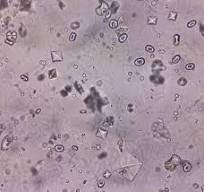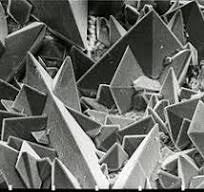Oxalates and Kidney Stones
Oxalates are molecules found in certain foods such as spinach and cashews that are formed as the combination end product of several amino acids such as serine, glycine, and ascorbic acid, that can combine with calcium (a naturally occur ion in the blood also from food) in the blood to form calcium oxalate crystals. Foods that contain more than 100g of oxalates per serving include (but this IS NOT an exhaustive list):
- Beets
- Rhubarb
- Brussel Sprouts
- Carrots
- Spinach
- Tofu
- Rice Bran
- Almonds
- Snap Beans
- Cashews
- Soybeans
- Quinoa
- Blackberries
- Blueberries
- Figs
- Plum
- Raspberry
- Tangerine
- Sweet Potatoes
- Eggplant
- Kale
These oxalate crystals are needle shaped crystals called raphides. They are readily absorbed after ingestion, cannot be metabolized by mammals, and are largely eliminated through renal excretion. Calcium oxalate crystals get filtered by the glomeruli in the kidney unless they are large, and then they become “stuck” in the nephrons and form kidney stones, especially if you have the genetic propensity. Oxalates are toxic to the renal epithelial cells and can cause membrane injury. The common upper limit of normal for oxalate excretion is 45mg/day (0.5mmol/day). Chronic vitamin C oral use can also cause hyperoxaluria and kidney stones.
Kidney stones are EXTREMELY painful, and the symptoms associated with them are as following:
SEVERE and sudden onset pain on the abdomen sides or low back
- Nausea
- Vomiting
- Fever
- Chills
- Blood in the urine
- Cloudy urine
Small kidney stones can be passed in the urine, but larger ones greater than 9mm must be treated with lithotripsy (a procedure where a skilled physician blasts the stones into pieces for excretion, or surgery). The pain associated with kidney stones is very significant and usually requires pain management by the ER.
To check for oxalate crystals in the urine, you can have your doctor order a 24 hour urine oxalate test through Labcorp or Quest, and this will reveal urinary levels and the presence of toxicity.
Treatment for calcium oxalate crystals is largely dietary. You’ll need to go on a low oxalate diet, and read the book “Toxic Superfoods” by Sally Norton, MPH. She has some excellent information on how to change your diet if you are prone to kidney stones.
I was plagued by kidney stones 10 years ago from over eating spinach and cashews and the urologist NEVER told me to change my diet. After researching the subject, I found that you can lead a very normal life IF you curb your diet from high oxalate foods, and drink at least 64oz of water with electrolytes every day.
Professional Health Products has two supplements, Oxalate Scavenger, and Oxalate Balancer that contain nutrients such as: Calcium citrate, Magnesium oratate, vitamin B6 (P5P) or Calcium, Magnesium, and Zinc citrate with P5P which will bind the oxalate crystals.
Kidney stones are no fun and you can avoid them simply by being mindful with your diet. Find a list with high oxalate containing foods, and remove the top 10-15 of them completely from your diet and that should do the trick. Make sure you drink plenty of fresh water to cleanse the kidneys daily and you should be just fine.
Of note, it is my observation that patients with Bartonella are much more likely to develop kidney stones although to date, this is an anecdotal observation. I happen to be one of these patients.





